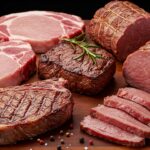Okay, let’s talk about something radical. Something that flies in the face of conventional wisdom, yet has a growing legion of devotees swearing by its transformative power. I’m talking about the carnivore diet – a way of eating that focuses exclusively on animal products. Yes, you read that right: meat, and only meat (and often water and salt).
Now, before you picture a caveman gnawing on a raw bone, let me clarify. We’re talking about a considered approach to an all-meat lifestyle, one that many are finding unlocks incredible benefits. This isn’t just about “eating steak all day” (though that’s part of it!). It’s about tapping into a primal way of eating that can potentially revolutionize your energy, focus, and overall health.
Sounds crazy? Maybe. But the results some people are experiencing are even crazier (in a good way!).
The Promise: More Than Just Protein
The carnivore diet isn’t just about getting your daily protein fix. Proponents experience a range of benefits, often including:
- Sustained Energy: Forget the mid-afternoon slump. Many carnivores report consistent, all-day energy without the jitters or crashes associated with carbohydrate-heavy diets. Imagine powering through your day with unwavering stamina.
- Laser-Sharp Focus: Brain fog? Gone. Carnivores often describe a remarkable increase in mental clarity and concentration. The theory is that eliminating plant-based toxins and focusing on nutrient-dense animal foods optimizes brain function.
- Weight Management (Often, Loss): While not the primary goal for everyone, many find that the carnivore diet naturally leads to fat loss. The high satiety of meat keeps you feeling full for longer, reducing cravings and often leading to a caloric deficit.
- Improved Digestion: This might surprise you, but many people with digestive issues (IBS, bloating, etc.) find significant relief on the carnivore diet. By eliminating potentially irritating plant compounds, the gut can often heal and function more efficiently.
- Reduced Inflammation: Some studies, and countless anecdotal reports, suggest that the carnivore diet can reduce inflammation throughout the body. This can have positive implications for a variety of chronic conditions.
- Simplicity: One of the biggest draws is the sheer simplicity. No more calorie counting, macro tracking, or complex meal prepping. You eat when you’re hungry, stop when you’re full, and focus on high-quality animal products.
Why Does It (Potentially) Work?
The carnivore diet’s purported benefits are rooted in a few key principles:
- Nutrient Density: Animal products are packed with bioavailable nutrients – vitamins, minerals, and essential fatty acids – that are readily absorbed and utilized by the body. Think Vitamin B12, iron, zinc, and omega-3 fatty acids, all in their most readily usable forms.
- Elimination of Plant Toxins: Plants contain natural compounds (like lectins, phytates, and oxalates) that can interfere with nutrient absorption and potentially cause inflammation in some individuals. The carnivore diet eliminates these.
- Ketosis: By drastically reducing carbohydrate intake, the carnivore diet often pushes the body into a state of ketosis, where it burns fat for fuel instead of glucose. This can lead to increased energy, fat loss, and mental clarity.
- Gut Microbiome Shift: While research is still ongoing, it’s believed that the carnivore diet significantly alters the gut microbiome. This could be beneficial for some individuals, particularly those with pre-existing gut issues.
What Do You Eat?
The core of the carnivore diet is, well, meat! This typically includes:
- Red Meat: Beef (steak, ground beef, roasts), lamb, bison, venison.
- Poultry: Chicken, turkey (though some carnivores stick primarily to red meat).
- Pork: Pork chops, bacon (choose high-quality, nitrate-free options).
- Fish and Seafood: Salmon, tuna, sardines, shrimp, etc. (a source of essential fatty acids).
- Eggs: A nutritional powerhouse.
- Organ Meats (Optional but Recommended): Liver, kidney, heart (incredibly nutrient-dense).
- Animal Fats: Tallow, lard (important for energy).
- Bone Broth: A source of collagen and minerals.
- Dairy (Optional and Limited): Some people include full-fat, dairy, mostly hard cheeses.
Water and salt are typically the only other additions.
Is It Right for You?
The carnivore diet is not a one-size-fits-all solution. It’s a significant dietary shift, and it’s crucial to:
- Do Your Research: Don’t jump in blindly. Understand the principles, potential benefits, and potential risks.
- Listen to Your Body: Pay close attention to how you feel. Some people thrive on this diet, while others may not.
- Consult with a Healthcare Professional: Especially if you have any underlying health conditions, it’s essential to talk to a doctor or registered dietitian before making major dietary changes.
- Source Quality Meats: Prioritize grass-fed, pasture-raised, and wild-caught options whenever possible.
The Takeaway:
The carnivore diet is a fascinating and potentially powerful approach to eating. While it’s not for everyone, the reported benefits – increased energy, mental clarity, improved digestion, and potential weight loss – are compelling. If you’re seeking a radical shift in your diet and are willing to embrace a meat-only lifestyle, it might be worth exploring. Just remember to do your research, listen to your body, and consult with a healthcare professional. You might just unleash your inner beast and discover a level of health and vitality you never thought possible.
Disclaimer: This blog post is for informational purposes only and does not constitute medical advice. Always consult with a qualified healthcare professional before making any dietary changes.


